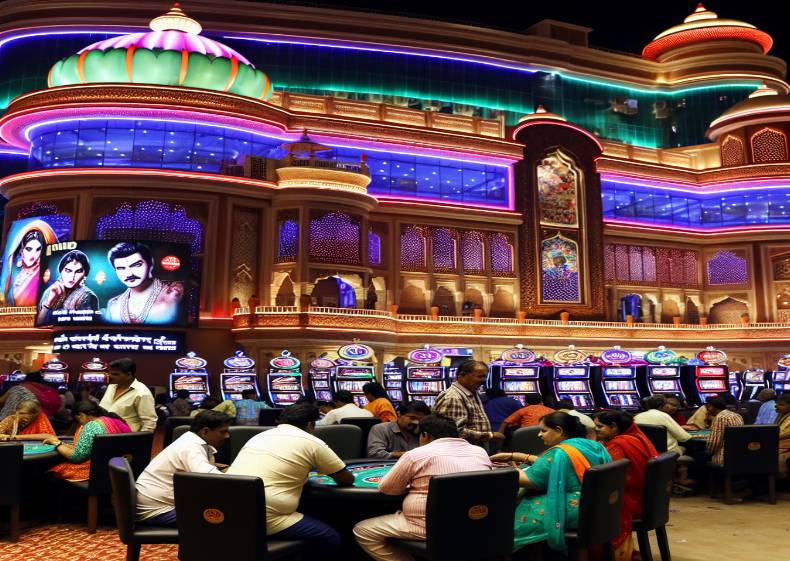Opening a casino in India can be a lucrative business opportunity due to the high demand for entertainment and gaming options in the country.
However, there are strict regulations and laws that govern the operation of casinos in India, so it is important to thoroughly research and understand the legal requirements before starting a casino business.
One of the key considerations when owning a casino in India is obtaining the necessary licenses and permits from the government authorities. This process can be time-consuming and complex, so it is advisable to seek legal counsel to ensure compliance with all regulations.
Additionally, it is important to consider the location of the casino, as certain states in India have restrictions on the operation of casinos. Choosing the right location can greatly impact the success of the business.
Finally, owning a casino in India requires a significant investment in terms of capital and resources. It is important to have a solid business plan and financial strategy in place to ensure the long-term sustainability of the casino.
Legal requirements for casinos
When it comes to legal requirements for casinos, there are a number of factors that must be considered. One of the most important aspects is obtaining a gaming license from the appropriate regulatory body. This license is necessary in order to operate a casino legally and ensures that the establishment meets all necessary regulations and standards.
In addition to obtaining a gaming license, casinos must also adhere to strict regulations regarding the age of their patrons. In most jurisdictions, individuals under the age of 18 are not allowed to enter a casino or participate in any form of gambling. Casinos are required to verify the age of their customers and can face severe penalties if they are found to be in violation of these laws.
Another important legal requirement for casinos is ensuring that they have proper security measures in place to protect both their customers and their assets. This includes having surveillance cameras throughout the establishment, as well as employing trained security personnel to monitor the premises and respond to any incidents that may arise.
Finally, casinos must also comply with anti-money laundering regulations, which are in place to prevent criminal activity such as money laundering and terrorist financing. This includes conducting thorough background checks on customers and reporting any suspicious financial transactions to the appropriate authorities. Failure to comply with these regulations can result in severe penalties for the pin up casino app download latest version.
Licensing process in India
In India, the licensing process for casinos is complex and stringent.
The government closely regulates the gambling industry to ensure transparency and prevent illegal activities.
Casinos must obtain a license from the state government to operate legally.
- Applicants must meet strict criteria to be eligible for a casino license.
- The licensing process involves background checks, financial audits, and compliance with gaming regulations.
- Once approved, the casino must adhere to strict operating guidelines and reporting requirements.
Failure to comply with licensing regulations can result in hefty fines, suspension, or revocation of the license.
Casinos must maintain high standards of integrity and accountability to retain their license.
- Regular inspections and audits are conducted to ensure compliance with licensing requirements.
- Any violations are promptly addressed by the regulatory authorities.
- Transparency and honesty are key factors in maintaining a casino license in India.
Overall, the licensing process in India is designed to protect consumers and uphold the integrity of the gambling industry.
Casinos must demonstrate their commitment to responsible gaming and ethical practices to operate successfully in the Indian market.
Financial considerations for ownership
When considering ownership of a casino, there are several important financial considerations to keep in mind. One of the most significant factors is the initial investment required to purchase or build a casino. This can include the cost of land, construction, licensing fees, and equipment. It is crucial to have a solid financial plan in place to ensure that you have enough capital to cover these expenses.
Another key financial consideration for casino ownership is the ongoing operating costs. This can include expenses such as staff salaries, utilities, maintenance, marketing, and regulatory compliance. It is important to carefully budget for these costs and have a plan for generating enough revenue to cover them.
Revenue streams are another important aspect to consider when owning a casino. Casinos typically make money through a combination of gambling revenue, hotel stays, food and beverage sales, and entertainment offerings. It is important to have a diverse range of revenue streams to ensure financial stability.
Taxes and regulatory fees are also important financial considerations for casino ownership. Casinos are subject to a variety of taxes at the local, state, and federal levels, as well as licensing fees and regulatory compliance costs. It is essential to understand the tax implications of owning a casino and budget accordingly.
Finally, it is important to consider the potential risks and rewards of casino ownership. While owning a casino can be a lucrative investment, it also comes with significant financial risks. It is important to conduct thorough market research and financial analysis before committing to casino ownership to ensure that it is a sound financial decision.
Marketing strategies for casinos
Casinos employ various marketing strategies to attract and retain customers. One common tactic is offering enticing promotions and bonuses to new and returning players. These can include welcome bonuses, free spins, cashback offers, and loyalty programs. By providing incentives for customers to play, casinos can increase player engagement and loyalty.
Another effective marketing strategy for casinos is hosting special events and tournaments. These events can range from high-stakes poker tournaments to themed parties and concerts. By creating a buzz and offering unique experiences, casinos can attract new customers and keep existing ones coming back for more.
Utilizing social media platforms is also crucial for casinos to reach a wider audience. By engaging with customers on platforms like Facebook, Instagram, and Twitter, casinos can promote their offerings, share updates and news, and interact with players in real time. Social media marketing can help casinos build brand awareness and connect with their target demographic.
Collaborating with influencers and celebrities is another effective marketing strategy for casinos. By partnering with well-known personalities, casinos can leverage their reach and influence to attract new customers and generate buzz. Influencers can promote the casino”s offerings to their followers, increasing brand visibility and credibility.
Finally, offering excellent customer service is key to retaining customers and building a positive reputation. By providing exceptional service, addressing customer concerns promptly, and creating a welcoming atmosphere, casinos can create a loyal customer base that will return time and time again. A strong focus on customer satisfaction can set a casino apart from its competitors and lead to long-term success.
Responsible gambling practices
Responsible gambling practices are essential for ensuring a safe and enjoyable experience for all casino players. It is important for individuals to set limits on their gambling activities and to avoid chasing losses. By practicing responsible gambling, players can reduce the risk of developing a gambling addiction and experiencing financial difficulties.
One key aspect of responsible gambling is setting a budget and sticking to it. Players should only gamble with money that they can afford to lose and should never use funds that are meant for essential expenses. By setting limits on how much money and time they spend at the casino, players can avoid falling into the trap of compulsive gambling.
Another important aspect of responsible gambling is knowing when to seek help. If a player feels that their gambling habits are becoming problematic or if they are experiencing negative consequences as a result of their gambling, they should reach out to a professional for assistance. Many casinos offer resources and support for players who may be struggling with gambling addiction.
Overall, practicing responsible gambling is crucial for maintaining a healthy relationship with casino games. By setting limits, seeking help when needed, and being mindful of their gambling habits, players can enjoy the thrill of the casino while also protecting themselves from potential harm. Remember, gambling should be a form of entertainment, not a source of stress or financial hardship.





